Energy Efficiency
Decoding the Eco-Friendly Impact of Heat Pumps

Curious about the real environmental effects of heat pumps? We have all the information you need.
In this article, we delve into the data, decoding the eco-friendly potential of heat pump technology. From their energy consumption to the factors influencing their sustainability, we explore it all.
Join us as we evaluate the carbon footprint reduction and environmental benefits that heat pumps offer. Get ready to uncover the truth and make informed choices for a greener future.
Key Takeaways
- Heat pumps offer a more sustainable and environmentally friendly choice for heating and cooling solutions.
- Heat pumps reduce greenhouse gas emissions and contribute to a cleaner environment.
- Integrating renewable energy sources with heat pumps enhances their environmental benefits.
- Heat pumps have a lower environmental impact compared to traditional heating systems.
Energy Consumption of Heat Pumps
We can assess the energy consumption of heat pumps by analyzing their efficiency and electricity usage. Heat pumps have gained popularity due to their energy efficiency advantages and cost effectiveness. Compared to traditional heating and cooling systems, heat pumps use less electricity to produce the same amount of heating or cooling, making them a more sustainable choice.
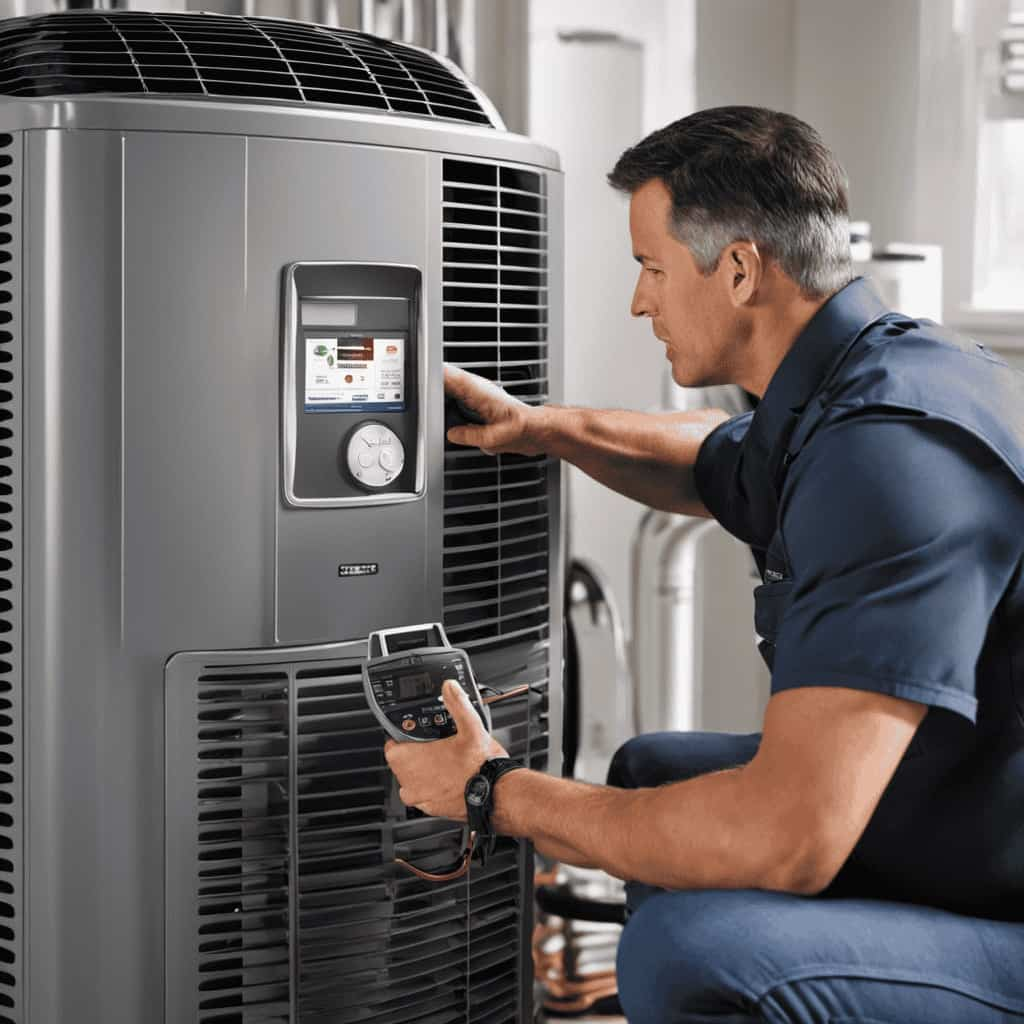
The efficiency of a heat pump is measured by its coefficient of performance (COP), which indicates the ratio of heat output to electricity input. Higher COP values indicate greater energy efficiency.
Additionally, conducting a cost effectiveness analysis can help determine the long-term savings associated with using heat pumps. By considering factors such as installation costs, energy savings, and maintenance expenses, individuals can make informed decisions about the most cost-effective heating and cooling solutions for their homes.
Environmental Benefits of Heat Pump Technology
By reducing greenhouse gas emissions, heat pump technology contributes to a cleaner and more sustainable environment. Heat pumps utilize renewable energy sources such as the heat in the air, ground, or water to provide heating and cooling solutions for buildings. This reduces the reliance on fossil fuels and decreases carbon dioxide emissions, which are major contributors to climate change.
Additionally, heat pump technology can be further incentivized through various programs and initiatives. Heat pump incentives, such as tax credits, rebates, and grants, encourage the adoption of this energy-efficient technology by making it more affordable for consumers. These incentives not only promote the use of heat pumps but also drive the market demand for cleaner and greener heating and cooling solutions.
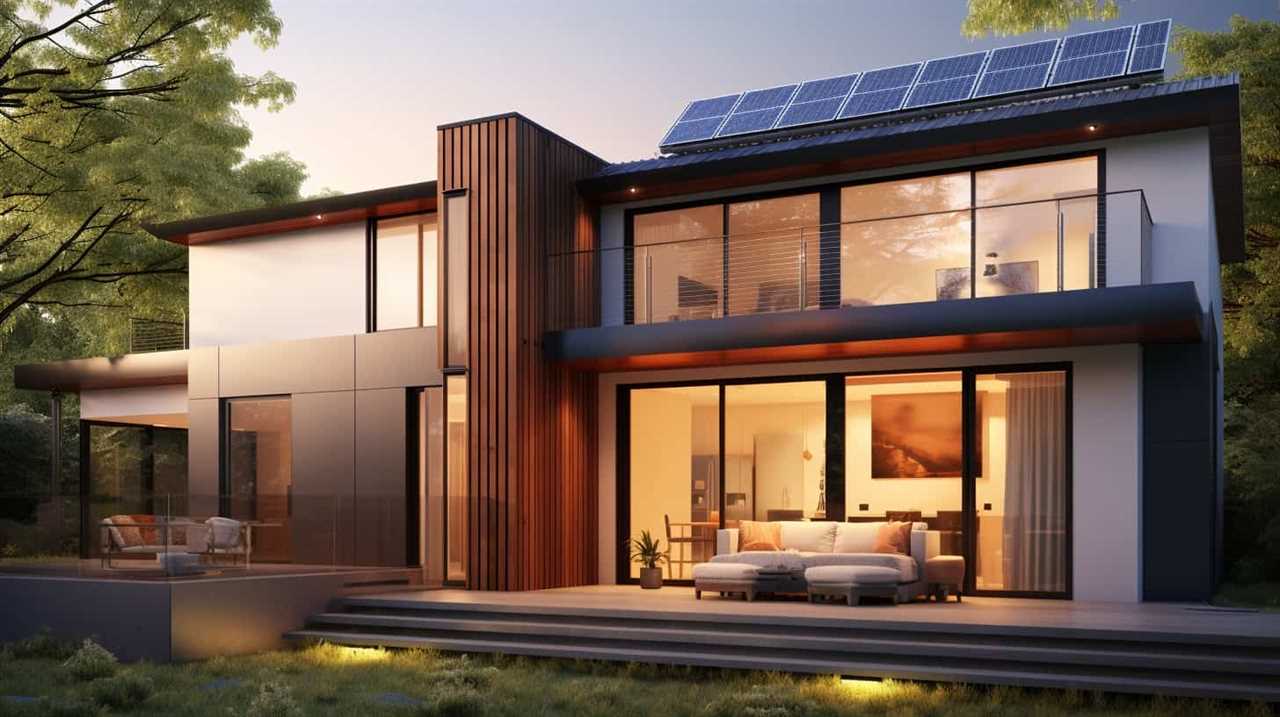
As a result, the widespread adoption of heat pump technology can significantly contribute to the reduction of greenhouse gas emissions and the overall improvement of the environment.
Factors Affecting the Environmental Sustainability of Heat Pumps
Factors such as energy source, insulation, and system efficiency play a crucial role in determining the environmental sustainability of heat pumps. To better understand their impact, conducting a life cycle analysis is essential. This analysis assesses the environmental impact of a heat pump throughout its entire lifespan, from production to disposal. Additionally, the integration of renewable energy sources is vital for maximizing the eco-friendliness of heat pumps. By utilizing renewable energy, such as solar or wind power, the carbon footprint of heat pumps can be significantly reduced. Furthermore, proper insulation ensures that heat is efficiently distributed, minimizing energy waste. To emphasize the importance of these factors, the table below summarizes their impact on the environmental sustainability of heat pumps.
| Factors | Impact on Environmental Sustainability |
|---|---|
| Energy Source | Determines the carbon footprint |
| Insulation | Minimizes energy waste |
| System Efficiency | Maximizes energy efficiency |
Heat Pumps and Carbon Footprint Reduction
Using heat pumps can significantly reduce our carbon footprint by up to 70% compared to traditional heating systems. This is because heat pumps utilize renewable energy sources, such as the heat from the ground, air, or water, to provide heating and cooling for our homes.
The carbon emissions associated with burning fossil fuels are greatly reduced, leading to a more sustainable and environmentally friendly way of heating our living spaces. Additionally, heat pumps are highly efficient, meaning they require less energy to operate and produce the same amount of heat as traditional heating systems. This not only results in lower energy consumption but also reduces our dependence on non-renewable resources.
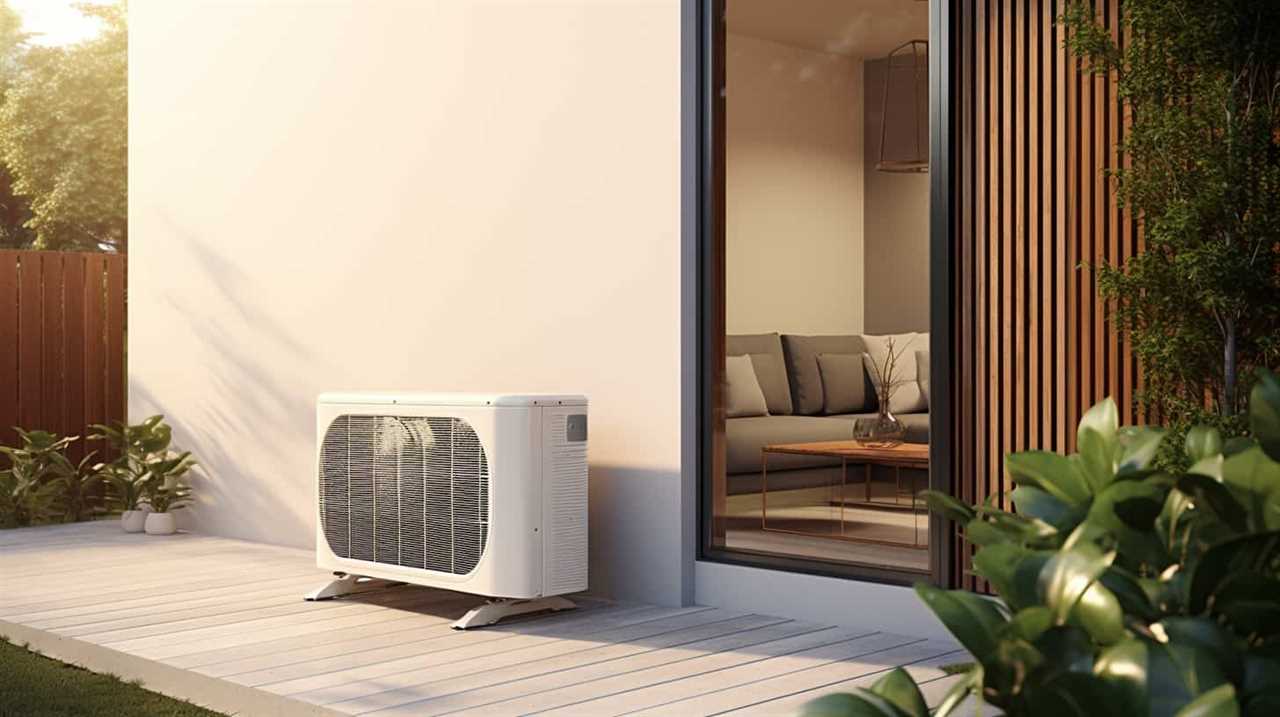
However, it’s important to consider the initial heat pump installation costs, as they can be higher than traditional systems. Nonetheless, the long-term energy savings and environmental benefits outweigh the upfront expenses.
Transitioning from discussing the carbon footprint reduction achieved through heat pump usage, let’s now evaluate the environmental impact of heat pump energy efficiency.
Evaluating the Environmental Impact of Heat Pump Energy Efficiency
We can assess the environmental impact of heat pump energy efficiency by analyzing its energy consumption and greenhouse gas emissions.
One way to evaluate this impact is through a life cycle assessment (LCA) which considers the environmental impact of a heat pump system from its production, operation, and disposal stages.

LCAs have shown that heat pumps can significantly reduce greenhouse gas emissions compared to traditional heating systems, especially when powered by renewable energy sources.
By integrating renewable energy into the operation of heat pumps, their environmental benefits can be further enhanced.
Renewable energy integration allows heat pumps to rely on clean and sustainable energy sources, reducing their overall carbon footprint.
This combination of energy efficiency and renewable energy integration makes heat pumps a promising solution for reducing environmental impact and promoting sustainable living.

Frequently Asked Questions
How Does the Energy Consumption of Heat Pumps Compare to Traditional Heating and Cooling Systems?
The energy consumption of heat pumps is significantly more efficient compared to traditional heating and cooling systems. This increased energy efficiency leads to a reduced environmental impact, making heat pumps a greener choice for climate control.
Are There Any Potential Drawbacks or Limitations to Using Heat Pump Technology?
There are potential challenges and limitations to using heat pump technology. These include higher upfront costs, the need for adequate insulation, and the environmental impact of refrigerants used in some systems.
Can Heat Pumps Be Used in All Regions and Climates?
Heat pumps can be used in various regions and climates, but their efficiency may vary. It’s important to consider the impact on the electricity grid, as heat pumps consume electricity to transfer heat.
What Are the Primary Factors That Affect the Lifespan and Durability of Heat Pumps?
Factors such as maintenance, usage patterns, and environmental conditions influence the lifespan and durability of heat pumps. Regular servicing, proper usage, and optimal climate conditions are key to maximizing their longevity.

Are There Any Government Incentives or Rebates Available for Installing Heat Pump Systems?
There are government incentives available for installing heat pump systems, which can provide financial benefits. These incentives vary by location and may include tax credits, rebates, and grants to encourage the adoption of eco-friendly heating and cooling solutions.
Conclusion
In conclusion, heat pumps offer an eco-friendly solution for heating and cooling needs. With their energy-efficient technology, heat pumps significantly reduce energy consumption and contribute to the reduction of carbon footprints.
Factors such as the source of electricity and proper maintenance can further enhance the environmental sustainability of heat pump systems. By evaluating the environmental impact of heat pump energy efficiency, we can make informed decisions to promote a greener future.
Energy Efficiency
Top 5 Economic Benefits of High-Efficiency Heat Pumps

High-efficiency heat pumps can bring us significant economic advantages. They can lower energy expenses and even qualify for tax incentives, transforming the heating of our homes.
With increased energy efficiency and lower maintenance expenses, we can save money and contribute to a sustainable future. And that’s not all – high-efficiency heat pumps can even enhance the value of our properties.
Discover the top 5 economic benefits of these game-changing appliances and unlock a world of savings and innovation.
Key Takeaways
- Energy savings of up to 50% compared to traditional methods
- Lower maintenance and repair expenses, reducing overall costs
- Availability of tax incentives and rebates, reducing upfront costs and providing annual tax savings
- Enhanced property value and increased market attractiveness
Reduced Energy Costs
We can significantly reduce our energy costs by using high-efficiency heat pumps. These innovative systems provide substantial energy savings compared to traditional heating and cooling methods.

According to recent studies, high-efficiency heat pumps can reduce energy consumption by up to 50%. This translates to significant cost savings for homeowners and businesses alike. Not only do these heat pumps lower energy bills, but they also have a positive environmental impact. By consuming less energy, they reduce greenhouse gas emissions, helping to combat climate change.
Additionally, high-efficiency heat pumps use refrigerants that have lower global warming potential, further minimizing their environmental footprint. With their ability to deliver both energy savings and a reduced environmental impact, high-efficiency heat pumps are a smart choice for anyone looking to optimize their energy efficiency and contribute to a sustainable future.
Increased Energy Efficiency
By upgrading to high-efficiency heat pumps, our energy efficiency is significantly increased. These advanced systems utilize innovative technologies that allow for improved indoor comfort while reducing our environmental impact.
High-efficiency heat pumps are designed to transfer heat from one space to another using minimal energy, resulting in substantial energy savings. According to recent studies, these heat pumps can achieve energy efficiency ratios (EER) of up to 13, which means they can produce 13 units of cooling or heating for every unit of electricity consumed.

This high level of efficiency not only reduces our energy consumption but also lowers our carbon footprint, contributing to environmental sustainability. In addition, by reducing energy usage, high-efficiency heat pumps help to minimize greenhouse gas emissions, further supporting our commitment to a greener future.
Lower Maintenance and Repair Expenses
The high-efficiency heat pumps offer us lower maintenance and repair expenses compared to traditional heating systems. This results in significant cost savings over time. Here are some reasons why:
-
Reduced breakdowns: High-efficiency heat pumps are designed to be more reliable, reducing the likelihood of sudden breakdowns and the need for expensive repairs.
-
Increased durability: These heat pumps have an extended lifespan compared to their traditional counterparts, meaning fewer replacements and repair costs.

-
Efficient operation: High-efficiency heat pumps are built with advanced technology that minimizes wear and tear on components, resulting in fewer maintenance requirements.
-
Professional maintenance: Many manufacturers offer maintenance plans for their high-efficiency heat pumps, ensuring regular check-ups and preventive care to prolong the lifespan and minimize repair expenses.
-
Warranty coverage: High-efficiency heat pumps often come with comprehensive warranties, covering repairs and replacements for specific periods, providing additional cost protection.
With lower maintenance and repair expenses, high-efficiency heat pumps offer long-term cost savings. This makes them an attractive option for homeowners and businesses alike.

Speaking of cost savings, let’s now explore the potential tax incentives and rebates available for high-efficiency heat pump installations.
Potential Tax Incentives and Rebates
Fortunately, there are often tax incentives and rebates available for high-efficiency heat pump installations, providing potential cost savings for homeowners and businesses.
Government support in the form of tax incentives can significantly reduce the upfront costs of purchasing and installing high-efficiency heat pumps. These incentives may come in the form of tax credits, deductions, or exemptions, allowing individuals and businesses to save money on their annual tax liabilities. In addition to the direct financial savings, these incentives also encourage the adoption of energy-efficient technologies, contributing to the overall reduction of greenhouse gas emissions.
Rebates, on the other hand, are typically offered by utility companies or other organizations to incentivize the installation of high-efficiency heat pumps. These rebates can help offset the initial investment by providing a cashback or a reduction in the purchase price.

Enhanced Property Value
When considering the economic benefits of high-efficiency heat pumps, it’s important to note that enhanced property value can be achieved through their installation. Here are some key reasons why:
-
Increased energy savings: High-efficiency heat pumps consume less energy than traditional heating systems, resulting in lower utility bills for homeowners. This reduction in energy consumption adds value to the property, as potential buyers are attracted to the long-term cost savings.
-
Reduced environmental impact: High-efficiency heat pumps produce fewer greenhouse gas emissions compared to conventional heating methods. This eco-friendly aspect appeals to environmentally-conscious buyers who prioritize sustainability and want to minimize their carbon footprint.
-
Enhanced comfort and convenience: Heat pumps offer consistent heating and cooling throughout the year, ensuring optimal comfort in any season. This reliable performance adds value to the property, as it eliminates the need for additional heating or cooling systems.

-
Longevity and durability: High-quality heat pumps are built to last, requiring minimal maintenance and repairs. This longevity factor increases the property’s value, as buyers appreciate the reliability and longevity of such systems.
-
Attractive selling point: High-efficiency heat pumps contribute to a property’s overall attractiveness in the real estate market. Their energy efficiency and environmental benefits make the property stand out among others, attracting potential buyers and potentially increasing its market value.
Frequently Asked Questions
How Long Does It Typically Take for the Reduced Energy Costs From High-Efficiency Heat Pumps to Offset the Initial Investment?
It typically takes a few years for the reduced energy costs from high-efficiency heat pumps to offset the initial investment. The payback period depends on factors such as installation timeline, energy prices, and usage patterns.
Are There Any Specific Maintenance Tasks That Homeowners Should Regularly Perform to Ensure the Optimal Performance and Longevity of Their High-Efficiency Heat Pumps?
Regular maintenance tasks are crucial for ensuring the optimal performance and longevity of our high-efficiency heat pumps. By performing routine checks, cleaning filters, and scheduling professional inspections, we can maximize efficiency and extend the lifespan of our systems.

What Are Some Common Tax Incentives and Rebates Available for Homeowners Who Install High-Efficiency Heat Pumps?
Tax incentives, rebates, and other financial incentives are available for homeowners who install high-efficiency heat pumps. These incentives can lead to significant cost savings and make the investment in a heat pump even more beneficial.
Can the Enhanced Property Value Resulting From the Installation of High-Efficiency Heat Pumps Vary Depending on the Location or Type of Property?
Location dependent property value and property type can impact the enhanced value resulting from high-efficiency heat pump installation. These factors influence the market demand, energy efficiency ratings, and overall perceived value of the property.
Are There Any Potential Drawbacks or Disadvantages to Consider When Investing in High-Efficiency Heat Pumps, Despite the Economic Benefits Mentioned?
When investing in high-efficiency heat pumps, there are potential drawbacks and disadvantages to consider. These include high upfront costs, the need for professional installation, and the requirement for regular maintenance.
Conclusion
In conclusion, high-efficiency heat pumps offer numerous economic benefits. They reduce energy costs, increase energy efficiency, and lower maintenance and repair expenses.

Additionally, potential tax incentives and rebates are available, further enhancing the financial advantages. Moreover, these heat pumps can enhance property value, making them a wise investment.
With these benefits in mind, it’s clear that installing high-efficiency heat pumps is like hitting the jackpot, putting money back in your pocket while keeping your home comfortable.
Energy Efficiency
Cutting-Edge Heat Pump Tech: A Low-Energy Home Solution

We have all the latest information on heat pump technology that can transform your home’s energy efficiency. Wave goodbye to expensive energy bills and say hello to a low-energy home solution.
Our cutting-edge heat pump tech is designed to keep you comfortable while minimizing your environmental impact. With advanced features and benefits galore, choosing the right heat pump for your low-energy home has never been easier.
Let us guide you towards a greener, more sustainable future.
Key Takeaways
- Heat pumps transfer heat from one location to another, providing both heating and cooling functions.
- Heat pump efficiency refers to how well the system converts energy input into useful heat output.
- Cutting-edge heat pump technology includes smart controls and integration with renewable energy sources.
- Low-energy heat pump solutions reduce utility costs, increase energy efficiency, and are compatible with renewable energy sources.
The Basics of Heat Pump Technology
We love exploring the basics of heat pump technology because it offers a low-energy solution for homes.

Heat pump operation is a fascinating process that involves transferring heat from one location to another. It works by extracting heat from a cold space and transferring it to a warmer space, using a refrigerant and a compressor. This allows heat pumps to provide both heating and cooling functions, making them versatile and efficient.
Heat pump efficiency is a crucial aspect to consider when choosing a system for your home. Higher efficiency means the heat pump can effectively transfer more heat while using less energy. This not only reduces your energy consumption but also helps to lower your utility bills.
Understanding the basics of heat pump technology is essential for making informed decisions about energy-efficient home solutions.
Understanding Energy Efficiency in Heat Pumps
Energy efficiency is a key factor to consider when evaluating the performance of heat pumps. When it comes to heat pump efficiency, it refers to how well the system converts energy input into useful heat output. A more efficient heat pump will require less energy to produce the same amount of heat, resulting in lower energy bills and reduced environmental impact.

Heat pump performance, on the other hand, is a measure of how well the system can maintain a desired temperature in different conditions. Factors such as the size, insulation, and location of the home can impact the performance of a heat pump.
Understanding both heat pump efficiency and performance is crucial in making informed decisions about heating and cooling options for your home.
Advanced Features of Cutting-Edge Heat Pump Tech
Some of the advanced features that make cutting-edge heat pump technology stand out include increased efficiency and improved performance. These advancements not only benefit homeowners but also contribute to a more sustainable future. Here are some of the key features that set cutting-edge heat pumps apart:
-
Smart Controls:

-
Cutting-edge heat pumps are equipped with intelligent control systems that optimize performance based on factors such as weather conditions and occupancy patterns. This ensures maximum efficiency and comfort while minimizing energy waste.
-
Smart controls also allow users to remotely monitor and adjust their heat pump settings, providing convenience and flexibility.
-
Renewable Energy Integration:
-
Advanced heat pumps can seamlessly integrate with renewable energy sources such as solar panels or wind turbines. This allows homeowners to harness clean, sustainable energy and further reduce their carbon footprint.

These advanced features not only make cutting-edge heat pump technology efficient and effective but also empower homeowners to make environmentally conscious choices.
Benefits of Low-Energy Heat Pump Solutions
The benefits of low-energy heat pump solutions include reduced utility costs and increased energy efficiency. By implementing these cost-effective solutions, homeowners can save money on their energy bills while also reducing their carbon footprint.
Heat pumps work by transferring heat from one area to another, making them highly efficient compared to traditional heating systems. They can be used for both heating and cooling purposes, providing year-round comfort. Additionally, heat pumps are compatible with renewable energy sources such as solar power, further reducing reliance on fossil fuels.
To maximize energy savings, here are some energy-saving tips:

- Set your thermostat to a comfortable yet efficient temperature.
- Keep doors and windows sealed to prevent heat loss.
- Insulate your home to minimize heat transfer.
Implementing these strategies, along with low-energy heat pump solutions, can lead to significant cost savings and a more sustainable future.
Tips for Choosing the Right Heat Pump for Your Low-Energy Home
When selecting a heat pump for our low-energy home, we should consider factors such as size, efficiency, and compatibility with renewable energy sources. Here are some tips to help you choose the right heat pump for your needs:
-
Heat pump size:
-
Assess the heating and cooling needs of your home to determine the appropriate size of the heat pump.

-
Consult with a professional to ensure accurate sizing calculations.
-
Heat pump installation:
-
Choose a reputable contractor with experience in heat pump installations.
-
Ensure proper installation by following manufacturer guidelines and local building codes.

Frequently Asked Questions
How Long Does It Typically Take for a Heat Pump to Pay for Itself in Energy Savings?
Typically, a heat pump pays for itself in energy savings within a certain period of time, known as the payback period. The length of this period depends on the energy efficiency of the heat pump and the specific usage patterns.
Can a Heat Pump Be Used as the Sole Heating and Cooling System for a Home?
Yes, a heat pump can serve as the sole heating and cooling system for a home. Its efficiency and advantages make it an ideal choice for reducing energy consumption and serving the needs of homeowners.
Are There Any Government Incentives or Tax Credits Available for Installing a Low-Energy Heat Pump?
Yes, there are government incentives and tax credits available for installing a low-energy heat pump. These incentives and credits can help make the cost of installation more affordable and encourage the use of energy-efficient technology.
What Maintenance Is Required for a Heat Pump System?
Heat pump maintenance is crucial to ensure optimal performance. Regularly cleaning or replacing filters, checking refrigerant levels, and inspecting electrical connections can prevent common issues like reduced efficiency or system breakdowns.

Can a Heat Pump Be Integrated With Renewable Energy Sources, Such as Solar Panels or Geothermal Systems?
Yes, a heat pump can be integrated with renewable energy sources like solar panels or geothermal systems. This can greatly increase heat pump efficiency and reduce overall energy costs.
Conclusion
In conclusion, cutting-edge heat pump technology offers a low-energy solution for homes. With advanced features and high energy efficiency, these heat pumps provide numerous benefits for homeowners.
Choosing the right heat pump for your low-energy home is essential, and it’s like finding the perfect puzzle piece that completes the picture of comfort and sustainability.
Embrace this innovative technology and enjoy a cozy and eco-friendly living experience.

Energy Efficiency
Brave the Costs: Monitor Your Heat Pump Energy

Do you feel exhausted from constantly high energy bills? Well, we have some great news for you: keeping track of how much energy your heat pump is using can empower you to manage and lower those costs.
In this article, we’ll show you how to brave the expenses and keep more money in your pocket. We’ll explore the benefits of monitoring, the tools and methods to measure usage, and the key metrics to analyze.
Get ready to optimize your heat pump efficiency and enjoy the freedom of lower energy bills.
Key Takeaways
- Heat pump energy savings can be achieved by transferring heat instead of generating it from scratch.
- Monitoring heat pump energy consumption provides valuable insights into usage patterns and helps identify inefficiencies.
- Smart meters and energy monitoring devices can be used to measure heat pump electricity usage and provide detailed information on energy consumption patterns.
- Optimizing heat pump energy efficiency can be done through regular maintenance, keeping the outdoor unit clear, adjusting thermostat settings, and practicing energy-saving habits.
Understanding Heat Pump Energy Efficiency
We’re going to dive into understanding the energy efficiency of heat pumps.
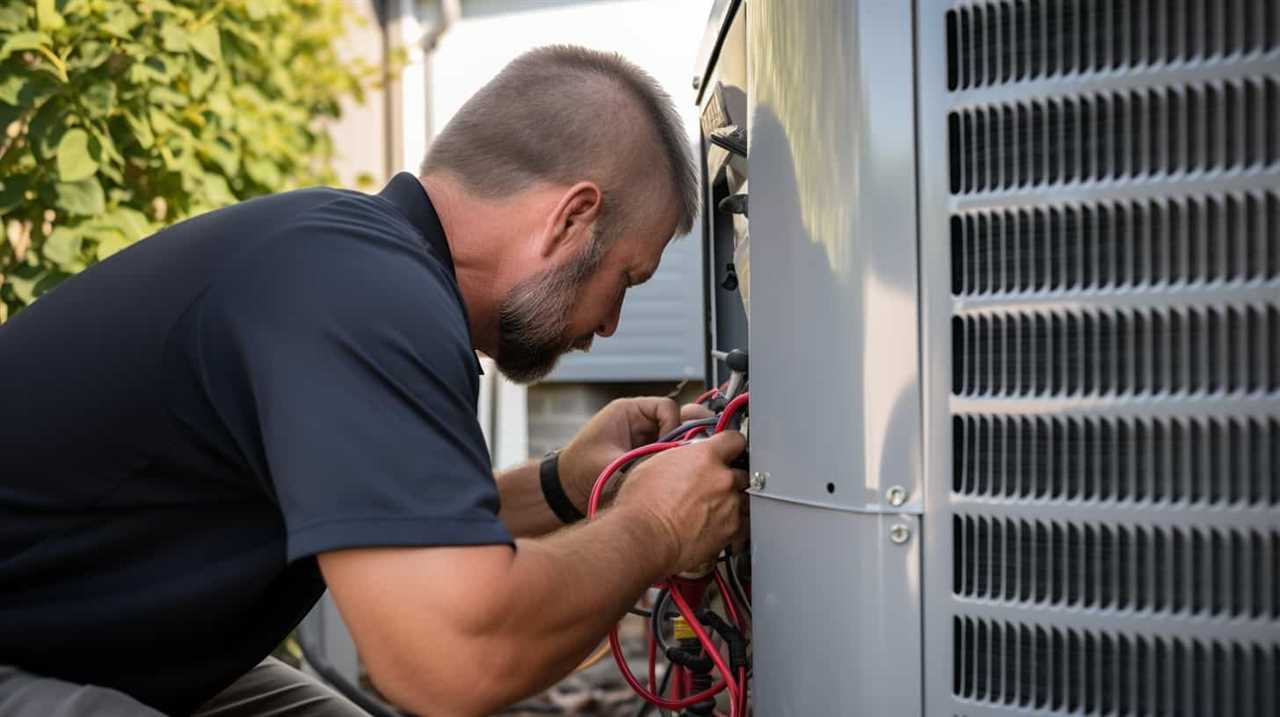
Heat pump energy savings and consumption factors are crucial to consider when evaluating the efficiency of your system. Heat pump energy savings refer to the amount of energy saved by using a heat pump instead of other heating or cooling methods. This is achieved through the transfer of heat from one area to another, rather than generating heat from scratch.
However, there are several factors that can affect the energy consumption of a heat pump. These include the size and efficiency of the unit, the climate in which it operates, and the insulation and sealing of the building.
Benefits of Monitoring Your Heat Pump Energy Consumption
By monitoring our heat pump energy consumption, we can gain valuable insights into our usage patterns and make more informed decisions about energy efficiency. Energy monitoring techniques allow us to track and analyze our energy usage in real-time, providing us with a comprehensive understanding of how our heat pump is performing.
This information enables us to identify any inefficiencies or areas for improvement, allowing us to make adjustments and optimize our energy consumption. Not only does this result in cost savings, but it also contributes to a more sustainable and environmentally friendly lifestyle.
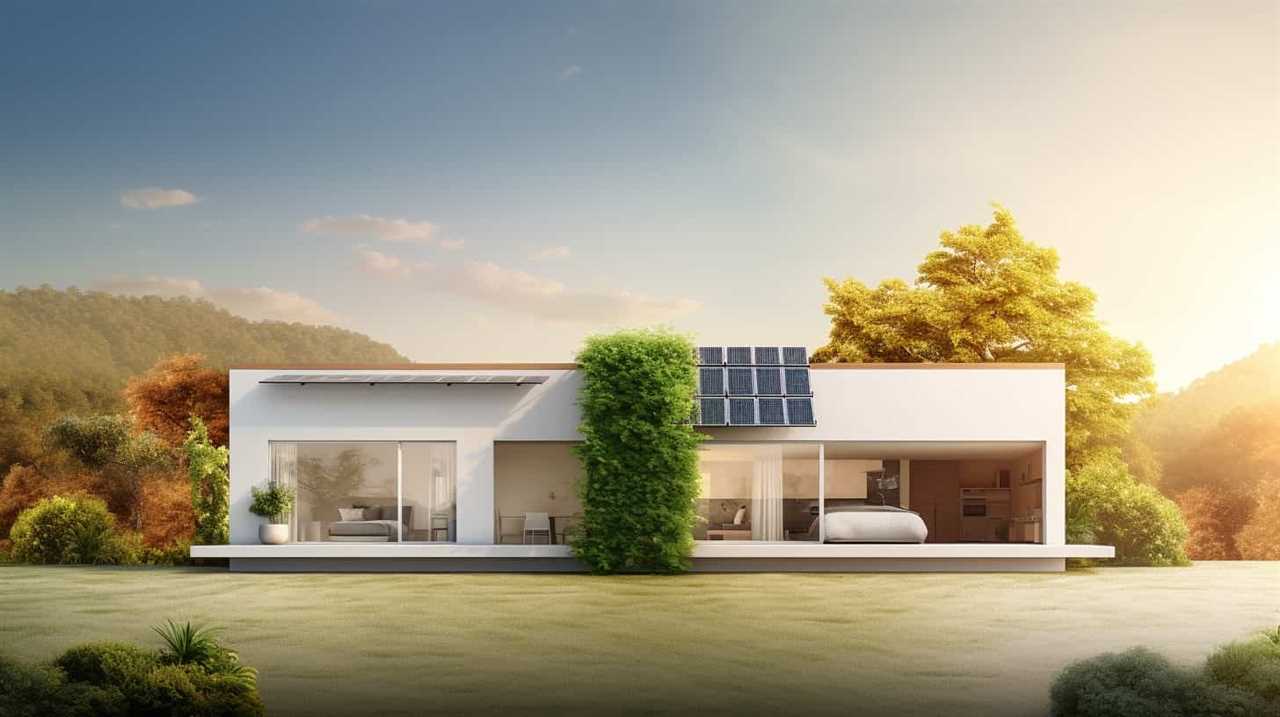
Tools and Methods to Measure Heat Pump Electricity Usage
To accurately measure our heat pump electricity usage, we’ll need the right tools and methods.
One effective tool is a smart meter, which can provide real-time data on our energy consumption. Smart meters are installed by utility companies and can automatically send usage information to both the customer and the utility provider. This allows us to monitor our heat pump energy usage and make adjustments to optimize efficiency.
Another option is to use energy monitoring devices, such as plug-in monitors or whole-house energy monitors. These devices can be easily installed and provide detailed information on our heat pump’s electricity usage.
By utilizing these tools, we can gain insights into our energy consumption patterns and identify potential areas for improvement.

Transitioning into the next section, let’s now explore the key metrics we should monitor when analyzing heat pump energy data.
Analyzing Heat Pump Energy Data: Key Metrics to Monitor
Let’s examine the key metrics we should monitor when analyzing heat pump energy data. To effectively manage heat pump energy and achieve savings, it’s crucial to keep track of the following metrics:
-
Energy Consumption: Monitoring the amount of energy consumed by your heat pump is essential in understanding its efficiency and identifying potential areas for improvement. By tracking energy consumption over time, you can identify patterns and adjust your usage accordingly to optimize energy savings.
-
System Performance: Evaluating the performance of your heat pump is vital for identifying any issues or inefficiencies. Monitoring metrics such as heating and cooling capacity, COP (Coefficient of Performance), and system runtimes can help you identify any fluctuations or deviations from expected performance levels.

-
Temperature Differential: Monitoring the temperature differential across the heat pump system can provide insights into its efficiency and effectiveness. By measuring the temperature difference between the outdoor and indoor units, you can assess the heat pump’s ability to transfer heat effectively and make necessary adjustments for improved energy management.
Tips for Optimizing Heat Pump Energy Efficiency
To maximize our heat pump’s energy efficiency, we should implement these tips.
Regular heat pump maintenance is crucial in ensuring optimal performance and energy savings. Schedule annual professional inspections to clean and tune the system, check for any leaks or issues, and replace filters as needed.
Additionally, keep the outdoor unit clear of debris and vegetation to allow for proper airflow.

Adjusting the thermostat settings can also contribute to energy savings. Set the temperature a few degrees lower in the winter and higher in the summer to reduce the workload on the heat pump. Utilize programmable thermostats to automatically adjust the temperature when you’re away from home.
Lastly, practicing energy-saving habits such as sealing air leaks, properly insulating your home, and using ceiling fans can further enhance the efficiency of your heat pump.
Frequently Asked Questions
Are Heat Pumps More Energy-Efficient Than Traditional Heating and Cooling Systems?
Yes, heat pumps are more energy-efficient than traditional heating and cooling systems. When comparing their performance, heat pumps use less energy to produce the same amount of heat or cool air, resulting in lower energy costs.
How Much Money Can I Save by Monitoring My Heat Pump Energy Consumption?
By tracking our heat pump energy consumption, we can save money. Monitoring allows us to identify inefficiencies and make adjustments to maximize heat pump energy savings. It gives us the freedom to control our costs and be more energy-efficient.

Can I Use a Smart Thermostat to Monitor My Heat Pump Energy Usage?
Yes, we can use a smart thermostat to monitor our heat pump energy usage. It provides benefits such as energy saving tips and allows us to have more freedom and control over our heating and cooling systems.
What Are the Most Common Causes of Energy Inefficiency in Heat Pumps?
The most common causes of energy inefficiency in heat pumps include improper installation, lack of maintenance, clogged filters, and outdated equipment. Regular monitoring and addressing these issues can help improve energy efficiency and reduce costs.
Is It Possible to Compare My Heat Pump’s Energy Usage With Similar Models to See if It’s Performing Optimally?
Yes, it is possible to compare our heat pump’s energy usage with similar models to determine if it’s performing optimally. This can help us identify inefficiencies and realize the benefits of heat pump monitoring.
Conclusion
In conclusion, monitoring your heat pump energy consumption is a wise investment that can yield significant benefits. By understanding your heat pump’s efficiency and analyzing key metrics, you can optimize its performance and reduce energy costs.

With the right tools and methods, you can accurately measure and track your heat pump’s electricity usage. So, don’t shy away from the costs; instead, embrace the opportunity to save money and energy by monitoring your heat pump’s energy.
-

 Residential and Commercial Applications3 months ago
Residential and Commercial Applications3 months agoBest Amana Heat Pump Reviews
-

 Thermal Energy Transfer3 months ago
Thermal Energy Transfer3 months agoBreakthroughs in Modern Heat Pump Systems: Thermal Energy Edition
-

 Residential and Commercial Applications3 months ago
Residential and Commercial Applications3 months agoBest Heat Pump
-

 Geothermal Heat Pumps2 months ago
Geothermal Heat Pumps2 months agoUpgrade Your Comfort with Our Efficient HVAC Systems
-

 Geothermal Heat Pumps2 months ago
Geothermal Heat Pumps2 months agoInnovative Geothermal Heat Pump Manufacturers Revolutionize Energy Efficiency
-

 Air Conditioning4 weeks ago
Air Conditioning4 weeks agoExploring Energy-Efficient Air Conditioning Heat Pumps
-

 Thermal Energy Transfer3 months ago
Thermal Energy Transfer3 months agoBoost Your Heat Pump Efficiency: Interactive Guide
-

 Residential and Commercial Applications3 months ago
Residential and Commercial Applications3 months agoBest Portable Heat Pump Heat & AC











